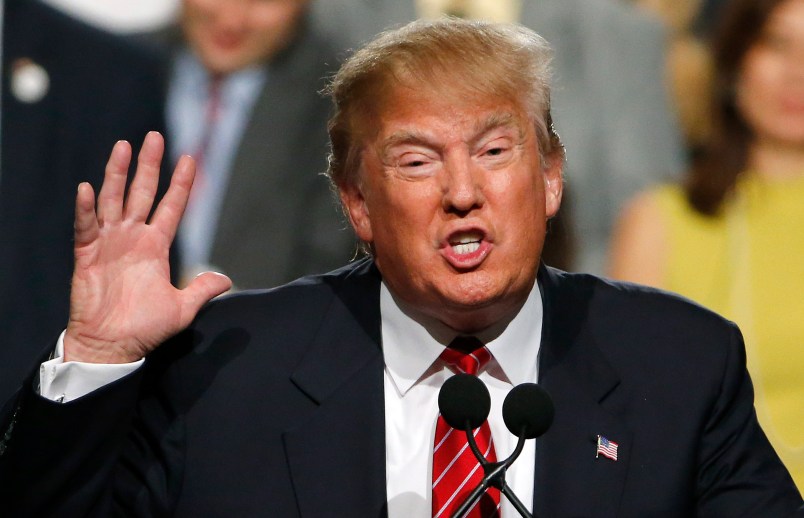The Washington Examiner’s Byron York recently asked Donald Trump if he believes the candidacy of third-party billionaire Ross Perot threw the 1992 presidential election to Bill Clinton. Trump, not missing a beat, responded affirmatively: “Totally. I think every single vote that went to Ross Perot came from Bush. Virtually every one of his 19 percentage points came from the Republicans. If Ross Perot didn’t run, you have never heard of Bill Clinton.”
Yet despite this belief and his insistence that he wants to continue his candidacy as a Republican, Trump refused to completely close the door on a third-party run.
Echoing common wisdom among journalists and GOP operatives, Dan Senor, a former Bush administration official and Romney adviser, told The New York Times:
Perot’s intensely nationalist and protectionist politics resonated with a lot of center-right voters that otherwise would have voted Republican. And the environment today is even more intensely populist. If Trump were to run as an independent, who knows what impact he could have in what will otherwise be a close election?
There’s a lot to like in a comparison between the two: Both are “goofy” billionaires willing to speak “hard truths” to a political establishment that has grown increasingly out-of-touch with average voters. But both Trump and Senor have it wrong: Ross Perot didn’t draw votes disproportionately from Republicans. And Donald Trump would.
While Senor is right that Perot is best remembered for his “nationalist and protectionist” policies, including curbing illegal immigration and opposing free trade, Perot was surprisingly liberal on a number of issues. He supported abortion rights; Trump used to be pro-choice, but is now pro-life. He promoted higher taxes, specifically on wealthy Americans, as part of his ambitious plan to reduce the deficit. He emphasized the need for more education funding; Trump emphasizes school choice. He argued against the right to own machine guns; Trump has supported some gun control in the past, but now does not. Perot also made a striking plea for stricter environmental regulation (Trump’s disdain for the environment is one of the only constants in his long public career) and proposed large cuts in defense spending (Trump proposes the opposite).
Perot even suggested expanding Medicare to all Americans, a position now embraced by only one presidential candidate: Democratic Socialist Bernie Sanders.
Even with Perot’s relatively liberal policy ideas, it still makes sense that center-right voters could have flocked to Perot because of his passion for issues like the deficit. But there is simply no evidence that Perot’s candidacy bled votes disproportionately from Bush. Exit polls showed Clinton and Bush in a tie among Perot voters as a second choice at 38 percent each, a sign Perot’s policy positions were more eclectic than we like to admit. Moreover, as MSNBC’s Steve Kornacki points out in an excellent Twitter essay, Clinton surged in the polls following Perot’s premature exit from the race, only to see the polls tighten once again when he returned a few weeks later.
In fact, the website OnTheIssues.org rates Ross Perot as a ‘Moderate Liberal’ on their ideological spectrum. Perot is closer to Bernie Sanders (who is a ‘Hardcore Liberal’) than Donald Trump, who earns the ‘Libertarian-Leaning Conservative’ moniker.
This underscores an important truth: Donald Trump is a very conservative Republican running for president. Ross Perot was far from that when he undertook the most successful third-party run in a generation. If Donald Trump takes the plunge and runs as an independent, you can be sure he will take almost exclusively disaffected Republicans with him.
Kenton Tilford is a politics writer and freelancer.







Run Donald, run!
I had been tempted to bring up the comparison within comments of other posts but I see the differences between the two as HUGE.
Perot was, more often than not, specific and detailed (remember the half hour TV timeslots he bought were he went through his charts?). Trump will be all rhetoric until he drops out. Don’t expect more about any issue than assurances that he has a secret plan – like he does for ISIS. Perot was (is) self-made (no bankruptcies that I know of), participated in his own heroics, was a family man in the way that is expected in the conservative narrative. Although various GOPers have blown gaping holes in the “family values” brand in recent years Trump will still be asked about the habit of trading in wives for newer models (and test driving them while still married).
In short, Perot could go toe-to-toe with any candidate (using facts, ideas, and reason) whereas Trump has nothing but bluster. That might work in business, especially where you hold all the cards, but Trump will be eaten alive using that approach in the later part of the campaign.
Sure, Perot had some eccentricities, and some weird ideas but I don’t think the comparison fits at all.
Yes, and Bernie Sanders is the new Ralph Nader (and the misty-eyed version of Candidate Obama, because anything that can throw Hillary under the bus is too irresistible for upper-middle-class lefties who loathe her).
Perot was once described as “half wombat, half Ferengi”
Trump is 100% asshat
specific and detailed?
Perot never once provided any details but always claimed to have plans that would be disclosed at a later date.